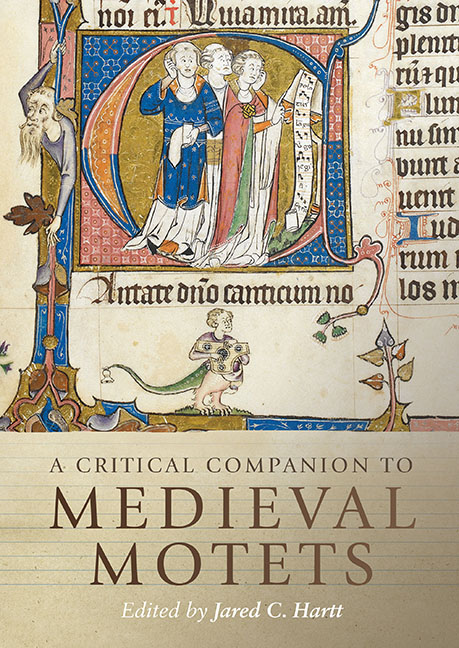Book contents
- Frontmatter
- Dedication
- Contents
- List of Figures
- List of Music Examples
- List of Tables
- List of Contributors
- Preface
- Acknowledgments
- Abbreviations
- Introduction: Approaching Medieval Motets
- 1 The Genre(s) of Medieval Motets
- 2 Origins and Interactions: Clausula, Motet, Conductus
- 3 Tracing the Tenor in Medieval Motets
- 4 Isorhythm
- 5 Notation
- 6 Thirteenth-Century Motet Functions: Views through the Lens of the Portare Motet Family
- 7 A Prism of its Time: Social Functions of the Motet in Fourteenth-Century France
- 8 Motets, Manuscript Culture, Mise-en-page
- 9 Clerics, Courtiers, and the Vernacular Two-Voice Motet: The Case of Fines amouretes / Fiat and the Roman de la poire
- 10 When Words Converge and Meanings Diverge: Counterexamples to Polytextuality in the Thirteenth-Century Mote
- 11 Motets in Chansonniers and the Other Culture of the French Thirteenth-Century Motet
- 12 Building a Motet around Quoted Material: Textual and Musical Structure in Motets Based on Monophonic Songs
- 13 The Duet Motet in England: Genre, Tonal Coherence, Reconstruction
- 14 Materia Matters: Reconstructing Colla/Bona
- 15 Machaut’s Motet 10 and its Interconnections
- 16 A Motet Conceived in Troubled Times: Machaut’s Motet 22
- 17 A Motet Ahead of its Time? The Curious Case of Portio nature/Ida capillorum
- Bibliography of Works Cited
- Select Glossary
- Index of Cited Motets
- General Index
- Studies in Medieval and Renaissance Music
9 - Clerics, Courtiers, and the Vernacular Two-Voice Motet: The Case of Fines amouretes / Fiat and the Roman de la poire
Published online by Cambridge University Press: 21 October 2020
- Frontmatter
- Dedication
- Contents
- List of Figures
- List of Music Examples
- List of Tables
- List of Contributors
- Preface
- Acknowledgments
- Abbreviations
- Introduction: Approaching Medieval Motets
- 1 The Genre(s) of Medieval Motets
- 2 Origins and Interactions: Clausula, Motet, Conductus
- 3 Tracing the Tenor in Medieval Motets
- 4 Isorhythm
- 5 Notation
- 6 Thirteenth-Century Motet Functions: Views through the Lens of the Portare Motet Family
- 7 A Prism of its Time: Social Functions of the Motet in Fourteenth-Century France
- 8 Motets, Manuscript Culture, Mise-en-page
- 9 Clerics, Courtiers, and the Vernacular Two-Voice Motet: The Case of Fines amouretes / Fiat and the Roman de la poire
- 10 When Words Converge and Meanings Diverge: Counterexamples to Polytextuality in the Thirteenth-Century Mote
- 11 Motets in Chansonniers and the Other Culture of the French Thirteenth-Century Motet
- 12 Building a Motet around Quoted Material: Textual and Musical Structure in Motets Based on Monophonic Songs
- 13 The Duet Motet in England: Genre, Tonal Coherence, Reconstruction
- 14 Materia Matters: Reconstructing Colla/Bona
- 15 Machaut’s Motet 10 and its Interconnections
- 16 A Motet Conceived in Troubled Times: Machaut’s Motet 22
- 17 A Motet Ahead of its Time? The Curious Case of Portio nature/Ida capillorum
- Bibliography of Works Cited
- Select Glossary
- Index of Cited Motets
- General Index
- Studies in Medieval and Renaissance Music
Summary
IN HIS 1993 BOOK, Discarding Images, Christopher Page offered a sustained critique of studies of intertextuality in the ars antiqua motet. Page argued that modern scholars who undertook nuanced interpretations of the relationships between the different voices of polytextual motets were operating from a personal bias toward bookishness. Reinterpreting oft-cited passages of Johannes de Grocheio's De musica regarding the literate audience of the medieval motet, Page reacted against the scholarly tendency to view this audience as a cultural or intellectual elite who interpreted motets ‘in a fashion that somehow approximates to what a musicologist, armed with dictionaries, concordances, the Glossa ordinaria, and more besides can accomplish’. Scholars such as Sylvia Huot and others viewed the subtle, intertextual meanings that emerged when interpreting the motet voices against one another as evidence of the learnedness of their composers and audiences. Page disagreed, arguing that these intertextual interpretations highlighted fortuitous, rather than intentional, connections, and hypothesizing that the motet composers of the thirteenth century were more interested in using musical structure to highlight the phonic qualities of their texts, such as the rhyme scheme and rhyme sounds. The reaction to Page's critique and his novel theory of motet aesthetics was swift and largely negative. Moreover, in the decades that followed, intertextual analyses of motets, many directly inspired by Huot's work, proliferated, arguably forming the mainstream of current ars antiqua motet scholarship. Although they successfully showcase the interpretive possibilities of the genre, these recent studies have perpetuated other scholarly biases that Page rightly criticized in Discarding Images. Page warned, for example, that intertextual motet interpretations overwhelmingly focused on just one source: the old corpus of Mo. He also noted that intertextual analyses privileged motets that featured contrasting upper voices over the more numerous examples in which the texts of the upper voices were poetically similar in their theme, register, and genre.
Page also argued that the focus on intertextuality had led scholars to all but ignore a substantial portion of the motet repertoire: the two-voice motet. The two-voice motet repertory has arguably received less attention than it deserves, particularly from the hermeneutic perspectives that have animated so much recent research on the genre.
- Type
- Chapter
- Information
- A Critical Companion to Medieval Motets , pp. 193 - 204Publisher: Boydell & BrewerPrint publication year: 2018



